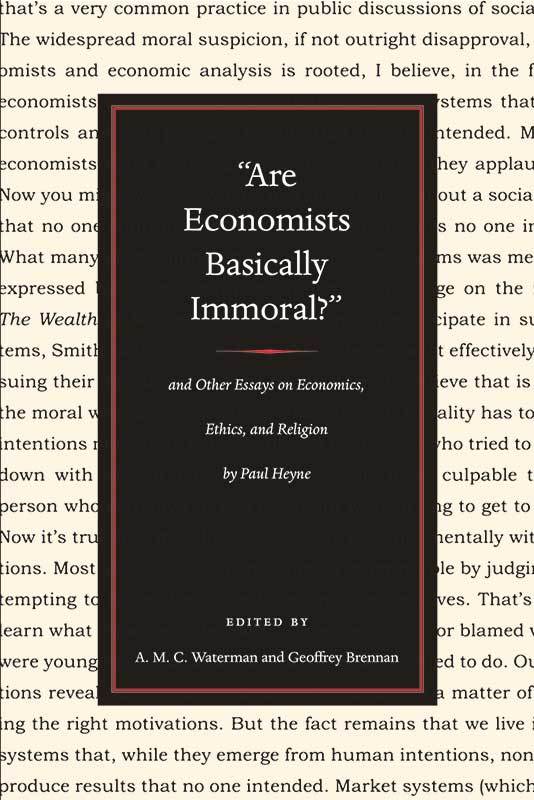Economics
-
“Are Economists Basically Immoral?” And Other Essays on Economics, Ethics, and Religion by Paul Heyne
by Paul Heyne
/ Learn MoreA well-trained theologian, a gifted and dedicated teacher of economics for over forty years, and the author of a highly regarded and widely-used textbook, The Economic Way of Thinking, Paul Heyne influenced generations of students of economics. Many of the essays in this volume are published here for the first time. The editors have divided Heyne’s essays thematically to cover…
-
“The Law,” “The State,” and Other Political Writings, 1843–1850
by Frédéric Bastiat
/ Learn More“The Law,” “The State,” and Other Political Writings, 1843–1850, collects nineteen of Bastiat’s “pamphlets,” or articles, ranging from the theory of value and rent, public choice and collective action, government intervention and regulation, the balance of trade, education, and trade unions to price controls, capital and growth, and taxation. Many of these are topics still relevant and debated today. In…
-
The Anti-capitalistic Mentality
by Ludwig von Mises
/ Learn MoreIn The Anti-capitalistic Mentality, the respected economist Ludwig von Mises plainly explains the causes of the irrational fear and hatred many intellectuals and others feel for capitalism. In five concise chapters, he traces the causation of the misunderstandings and resultant fears that cause resistance to economic development and social change. He enumerates and rebuts the economic arguments against and the…
-
Austrian Subjectivism and the Emergence of Entrepreneurship Theory
by Israel Kirzner
/ Learn MoreAustrian Subjectivism and the Emergence of Entrepreneurship Theory comprises several of Kirzner’s previously published papers on the subjects of methodological subjectivism and the history of entrepreneurship theory—topics of primary importance in Kirzner’s economic thought because one cannot fully understand entrepreneurship theory without considering subjectivism. The volume includes Kirzner’s seminal paper “Methodological Individualism, Market Equilibrium, and Market Process,” in which “Kirzner…
-
Between the Two World Wars
by Ludwig von Mises
/ Learn MoreIn 1934, Ludwig von Mises left his native Austria in fear of the Nazis, who seized all his papers in 1938 in Vienna and, Mises thought, destroyed them, but the papers were not destroyed. In 1996, Richard and Anna Ebeling discovered the papers in an archive in Moscow. This volume from Liberty Fund represents a treasure trove of important essays.
-
Bureaucracy
by Gordon Tullock
/ Learn MoreBureaucracy provides access to two important and influential books on bureaucracy by Gordon Tullock: The Politics of Bureaucracy (1965) and Economic Hierarchies, Organization and the Structure of Production (1992). When The Politics of Bureaucracy was published in 1965, bureaucracy was viewed by many people as benign—serving the public good with objectivity and omniscience. In Economic Hierarchies, Organization and the Structure…
-
Bureaucracy
by Ludwig von Mises
/ Learn MoreBureaucracy contrasts the two forms of economic management—that of a free-market economy and that of a bureaucracy. In the market economy entrepreneurs are driven to serve consumers by their desire to earn profits and to avoid losses. In a bureaucracy, the managers must comply with orders issued by the legislative body under which they operate; they may not spend without…
-
The Calculus of Consent
by James M. Buchanan and Gordon Tullock
/ Learn MoreThe Calculus of Consent was co-authored by Buchanan with Gordon Tullock, with whom Buchanan collaborated on many books and academic enterprises throughout their careers. As Robert D. Tollison states in the foreword, “[this book] is a radical departure from the way democracies conduct their business. The Calculus is already a book for the ages.” This classic work analyzes the political…
-
Can Capitalism Survive?
by Benjamin A. Rogge
/ Learn MoreBenjamin A. Rogge—late Distinguished Professor of Political Economy at Wabash College—was a representative of that most unusual species: economists who speak and write in clear English. He forsakes professional jargon for clarity and logic—and can even be downright funny. The nineteen essays in this volume explore the philosophy of freedom, the nature of economics, the business system, labor markets, money…
-
The Collected Works of Armen A. Alchian
by Armen A. Alchian
/ Learn MoreLiberty Fund is proud to present, in two volumes, The Collected Works of Armen A. Alchian, bringing together Alchian’s most influential essays, articles, editorials, and lectures to provide a comprehensive record of his thinking on a broad range of topics in economics. Armen Alchian has helped found several schools of economic thought and is the founder of the UCLA tradition…
-
Collected Works of John Stuart Mill
by John Stuart Mill
/ Learn MoreLiberty Fund is pleased to make available in paperback eight of the original thirty-three cloth volumes of the Collected Works of John Stuart Mill that were first published by the University of Toronto Press that remain most relevant to liberty and responsibility in the twenty-first century. Born in London in 1806 and educated at the knee of his father, the…
-
Commerce and Government Considered in Their Mutual Relationship
by Étienne Bonnot, Abbé de Condillac
/ Learn MoreFrench philosopher Abbé de Condillac produced perhaps the most original contributions to eighteenth-century economics. His conclusions as to the desirability of removing barriers to free trade and of competitive market economies mirrored Smith’s, published three months later. Commerce and Government has been called “one of the most sustained defenses of economic liberty in the eighteenth century.” In Condillac’s own words,…
35% OFF YOUR ENTIRE BOOK PURCHASE
With promo code:
SPRING2024
Expires June 30, 2024












